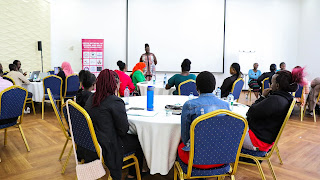A two day leadership workshop for Network Disability Activists
The Kenya Network of Women and Girls with Disabilities is one among other implementing partners in the Women Gaining Ground (WGG) Consortium through CREA. WGG program activities are focused on preventing and eliminating sexual and gender-based violence against women and girls, including those with disabilities as well as strengthening women’s leadership and women’s political participation in decision-making. The Network’s activities in Kenya focus on these broad themes.
Since 2022, we have worked and intend on working with 20 women with disabilities, champions, from across several counties namely Nairobi, Kitui, Busia, Kajiado, Machakos, Isiolo, Mandera, Meru, Nyeri, and Mombasa in Kenya to engage state and non-state duty bearers at community level in addressing violence against women and girls with disabilities.
Our work is also informed by the CEDAW Committee’s recommendations to Kenya: Protect women and girls with disabilities from all forms of violence and ensure that the perpetrators are prosecuted and adequately punished; Abolish the practice of sterilizing women and girls with disabilities by force and provide remedies for the victims.
In a workshop by the Network in 2022 under the WGG Program, we noted increased sexual and gender-based violence cases during the COVID 19 pandemic. As a Network therefore, and through support from CREA under the WGG program, we want to continue work towards addressing issues of gender-based violence against women and girls with disabilities.
One of the ways we are embracing is to strengthen the capacities of our champions to carry more advocacy at community level. We hope that through more access to tools and resources in leadership, our Champions’ confidence as well as levels of engagement will increase so that they engage more with state and non-state duty bearers in their respective counties to support access to justice for women and girls with disabilities. We anticipate that going into the future we shall have increased reporting of cases of violence against women and girls with disabilities and increased linkages with the justice system.
The Network’s 20 Champions reflect diversity in many ways, right from diverse disabilities, diverse ages, with a significant focus on young activists, diversity in terms of regions, from pastoralist and indigenous communities, rural places, as well as urban spaces. The Champions also bring with them expertise of working with communities in different spaces, some run radio shows in community radio stations, others have founded self-help groups working at community level for inclusion of women and girls with disabilities; others are actively involved in spaces around gender based violence.
Such diversity continues to be the strength of the Network and we believe that more access to new information and new tools and resources in carrying out advocacy will play a key role towards ensuring violence free communities for women and girls with disabilities, hence our leadership workshop.
The workshop is facilitated by Easter Okech, an African feminist well versed in advocacy strategies and is key in community organizing and mobilization. Working with Easter who also represents KEFEADO that is a part of the wider WGG consortium is an intentional effort by the Network to continue strengthening our cross movement collaborative work with different partners, both within and without the WGG consortium.




Comments
Post a Comment